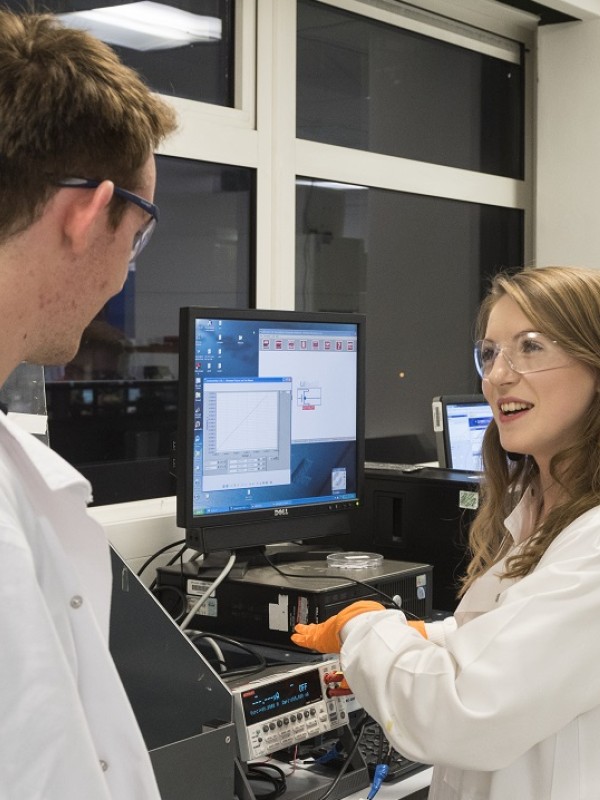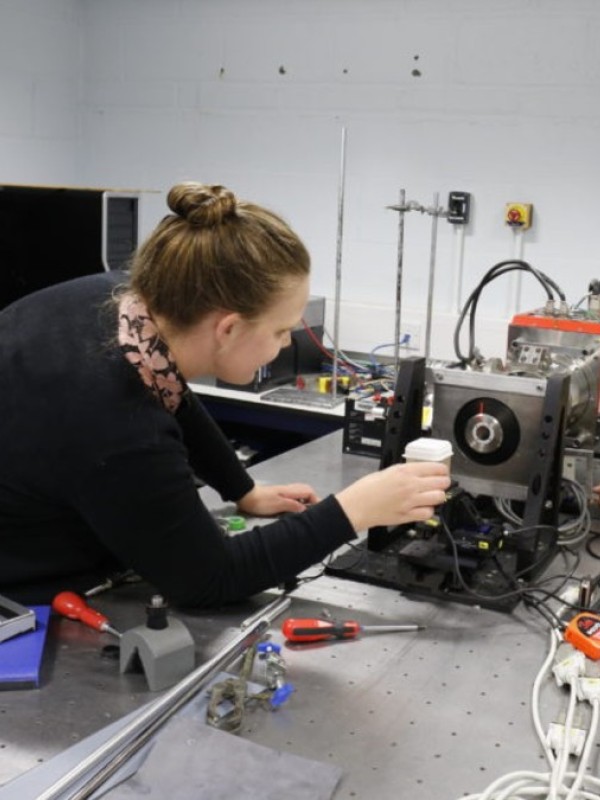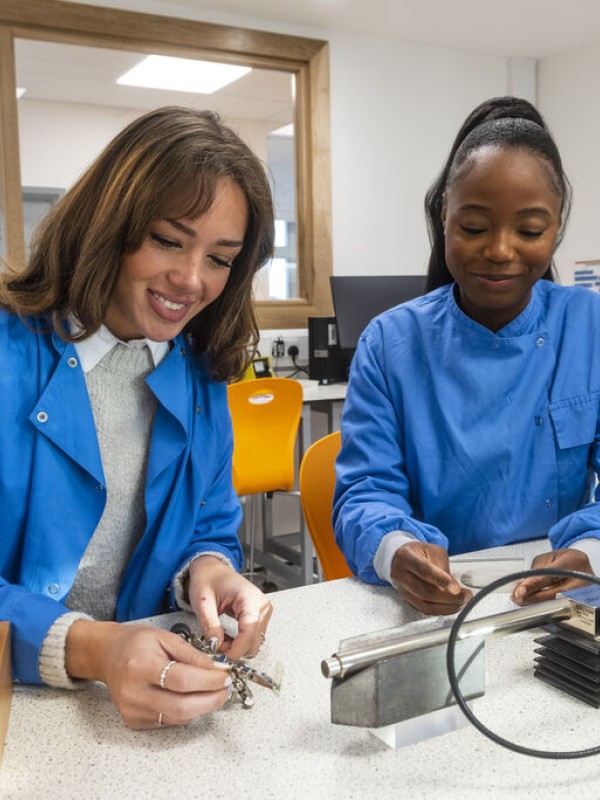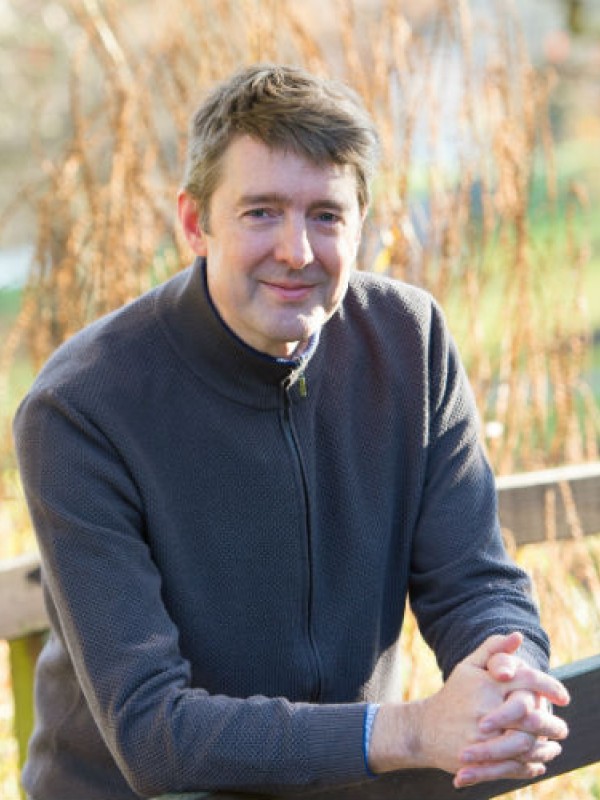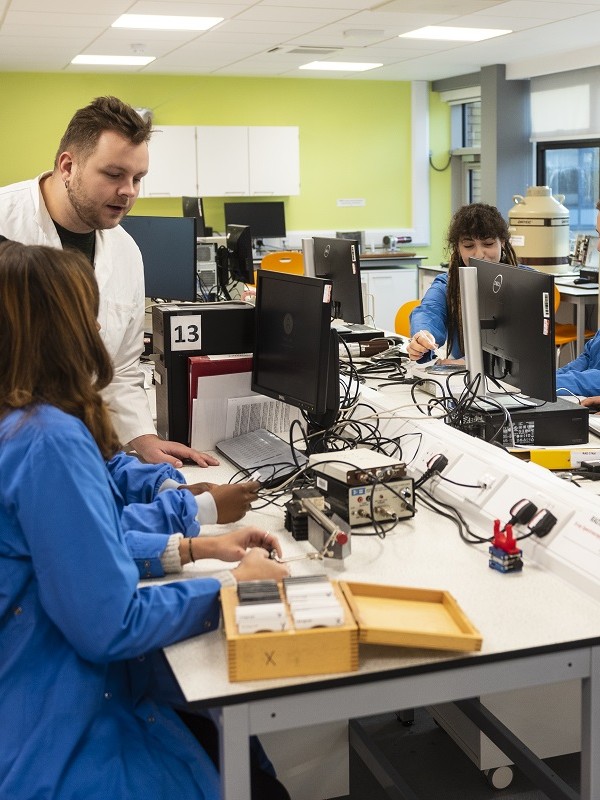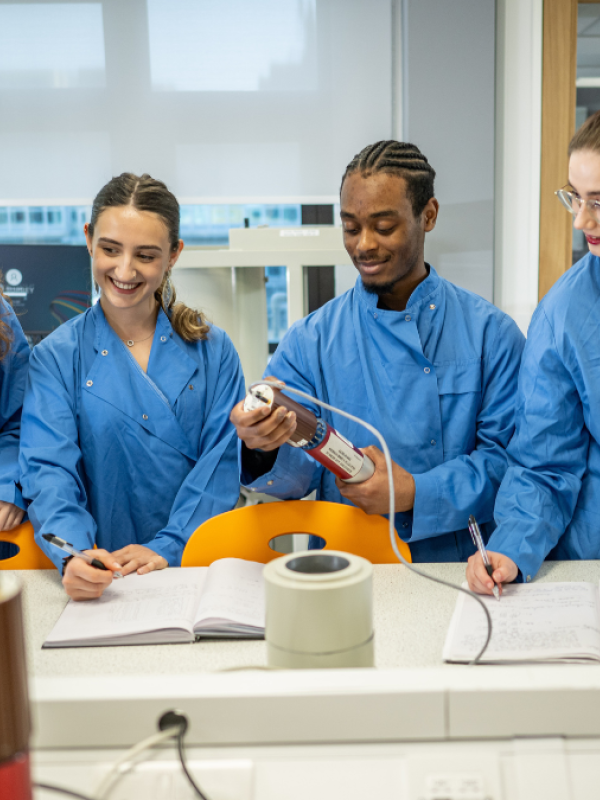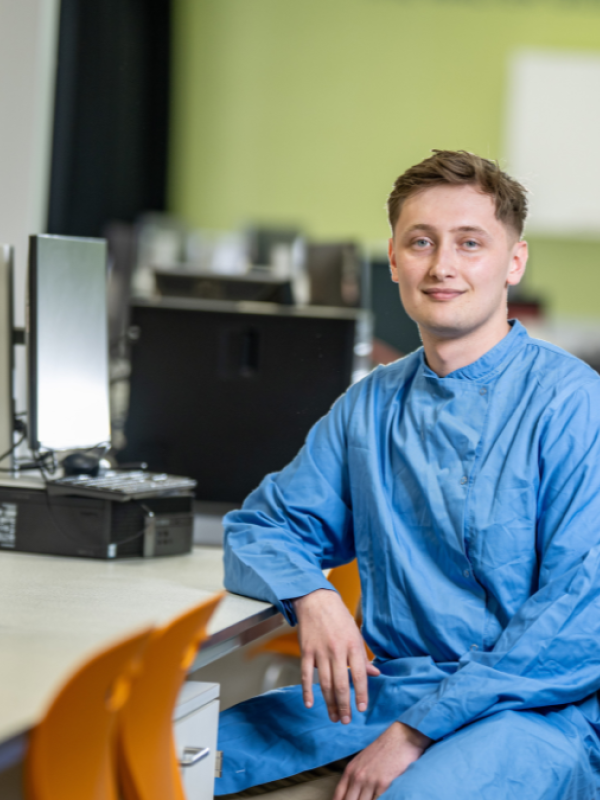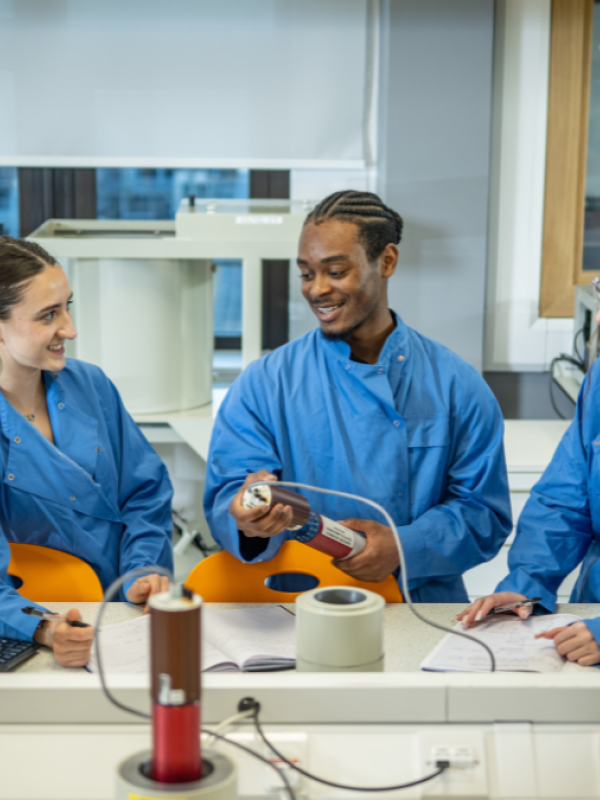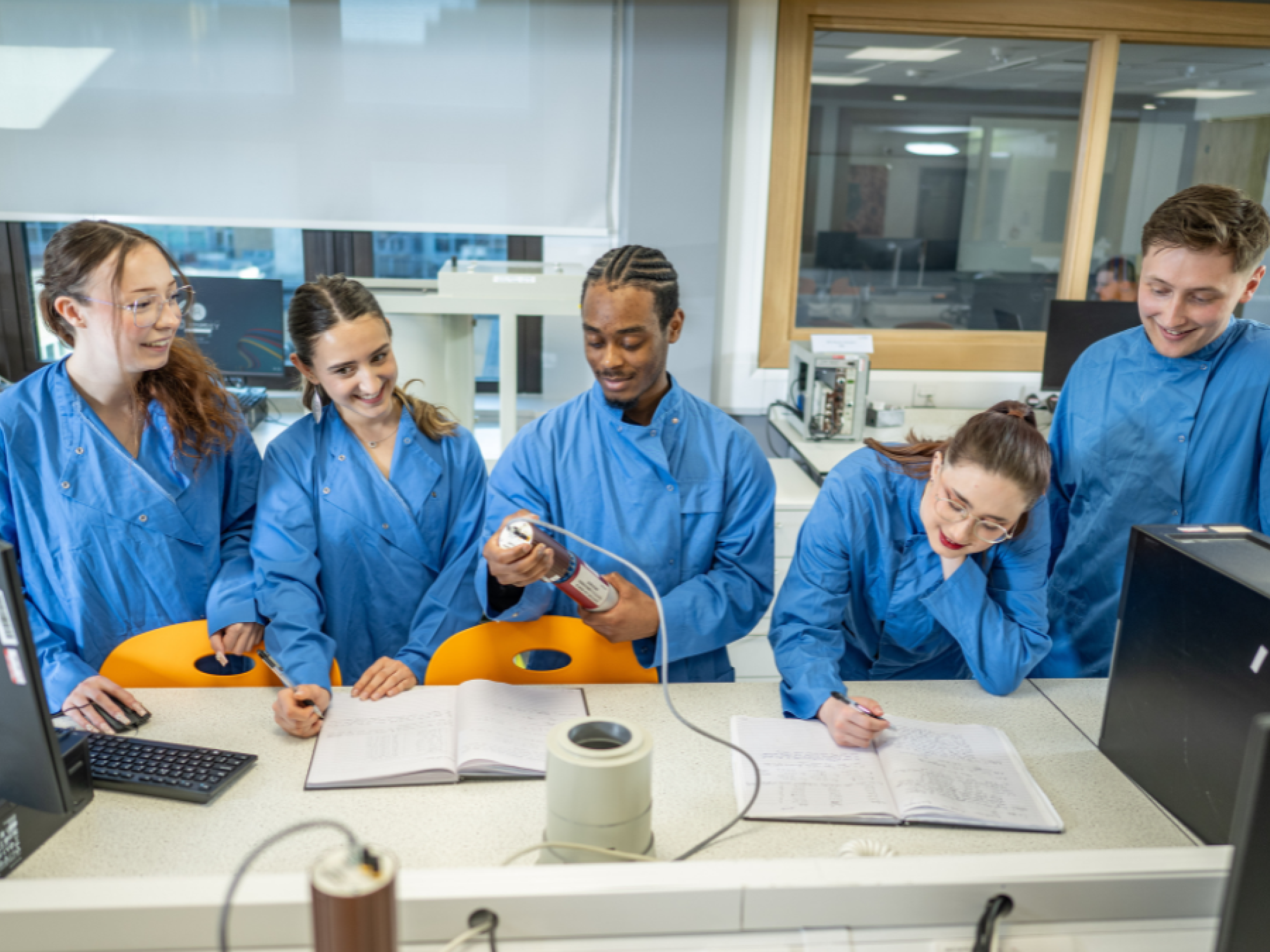
- Physics with Quantum Computing
BSc (Hons) or MPhys — 2027 entry Physics with Quantum Computing
Our BSc and MPhys Physics with Quantum Computing degrees will teach you core physics principles along with key quantum concepts. Gain specialist knowledge of this fast-growing tech to set you up for a variety of careers in both traditional and emerging fields.
4,161+ people have created a bespoke digital prospectus
Why choose
this course?
Quantum technologies harness the unusual features of the quantum world to perform tasks that are difficult with conventional technologies alone. These courses cover the full spectrum of this exciting and rapidly developing field – from lasers and photonics to quantum physics, quantum information and quantum computing. There are two unique aspects of both our courses:
Get industry-ready and gain the skills employers want with our award-winning Professional Training placements:
- With the BSc Physics with Quantum Computing degree, you have the option to take a paid Professional Training placement in industry, giving you invaluable hands-on experience to enhance your employability. Our students have placed all over the world including the NPL (UK), CERN (Switzerland) and TRIUMF (Canada).
- On our MPhys, you’ll take a year-long, masters-level integrated research placement. This can be in one of our world-leading research groups or at one of our international partner institutions.
Our focus on undergraduate research and innovation:
- All undergraduates have the opportunity to apply for paid 8-10 week summer research placements in our research groups and those of our South East Physics Network partners.
- We offer in-house ‘research and innovation’ and ‘enterprise’ grants that students can apply for to fund a research placement, attend a conference or develop a new business idea.
Statistics
94%
Of Surrey undergraduates are in work or further study within 15 months of graduating (Graduate Outcomes 2025, HESA)
15th in the UK
For overall student satisfaction* in the National Student Survey 2025
*Measured by % positivity based on Q1-24 for all institutions listed in the Guardian University Guide league tables.
Accreditation
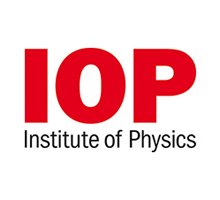
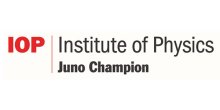
What you will study
Our physics and quantum computing courses combine elements of traditional physics with the study of quantum technologies, providing students with the ideal foundation to start a career in this emerging field.
You’ll learn about existing quantum technologies, such as the devices used to transmit internet data and those behind the lasers in Blu-ray players.
During your first year, you can switch between any of our specialist physics courses. You can apply to study for either a BSc or an MPhys. The latter is a direct route to a masters qualification, known as an integrated masters. On an MPhys, you’ll spend a year doing integrated research before returning for your final masters-level modules.
Professional recognition
MPhys - Institute of Physics (IOP)
Accredited by the Institute of Physics (IOP) for the purpose of fully meeting the educational requirement for Chartered Physicist.
Foundation year
If you don’t meet our entry requirements, you might still be able to apply for this degree with an Engineering and Physical Sciences Foundation Year. This is an extra year of study to develop your skills and make it easier for you to get started at university. On successful completion of your foundation year, you’ll be ready to progress to the first year of your degree.
To see what modules you’ll be studying, refer to the foundation tab in the 'course structure' section.
The academic year is divided into two semesters of 15 weeks each. Each semester consists of a period of teaching, revision/directed learning and assessment.
The structure of our programmes follow clear educational aims that are tailored to each programme. These are all outlined in the programme specifications which include further details such as the learning outcomes.
- Physics with Quantum Computing BSc (Hons)
- Physics with Quantum Computing BSc (Hons) with placement
- Physics with Quantum Computing BSc (Hons) with foundation year
- Physics with Quantum Computing BSc (Hons) with foundation year and placement
- Physics with Quantum Computing MPhys
Please note: The full module listing for the optional Professional Training placement part of your course is available in the relevant programme specification.
Modules
Modules listed are indicative, reflecting the information available at the time of publication. Modules are subject to teaching availability, student demand and/or class size caps.
The University operates a credit framework for all taught programmes based on a 15-credit tariff.
Course options
Year 1 - BSc (Hons)
Semester 1
Compulsory
This module covers some of the fundamental principles in classical physics including a discussion of units of measurement, the kinematics and dynamics of objects and conservation laws. This material revises and builds upon concepts that are first encountered in the A-level physics course and the study of mechanics as part of A-level mathematics.
View full module detailsThis module is designed to provide essential underpinning skills for the whole programme in the mathematics needed by physical scientists. The mathematics units of assessment are delivered on a supervised self-study basis - to allow flexible learning patterns to students with different mathematics skills and knowledge levels at University entry. The delivery method is by supported workshop classes and occasional lectures to introduce new topics, as required. The Essential Mathematics module consolidates and enhances mathematical skills to beyond (A2) Advanced Level standard, providing the mathematical foundations needed for subsequent Level FHEQ 4 Mathematics components and for the introductory Physics modules at Level FHEQ 4.
View full module detailsThis module covers a wide range of generic skills important in scientific investigation. These skills cover data handling, statistical analysis, Python programming skills, scientific writing, ethics (including academic misconduct), group working covering problem-solving, and public communication, plus library-based information research skills including information retrieval and referencing.
View full module detailsThis module covers introductory concepts of simple harmonic motion and waves, drawing on and bringing together examples from different branches of physics including mechanics, optics, electronics, and electromagnetism. Some of these concepts will build upon examples that may have been encountered as part of the Physics A-level material but others are new. It combines the mathematical description, physical interpretation as well as experiments and their analysis of oscillations and wave phenomena to provide students with a well-balanced introduction to the important physical concepts that are required for further study in the subsequent modules of your physics course.
View full module detailsSemester 2
Compulsory
This module introduces many of the fundamental concepts in astronomy, cosmology and relativity theory. It begins with classical (Newtonian) celestial mechanics, properties of stars and galaxies and some of the tools required in observation in Astronomy. Then it moves on to outline the concepts which underpin Einstein’s Special and General theories of relativity discussing events and physical phenomena from different frames of reference and in different co-ordinate systems, and the way in which mathematics relates these descriptions. Concepts of inertial frames of reference, Lorentz transformations, invariants, and elementary relativity principles and covariance, will be introduced, as well as a discussion of the ideas underpinning the general theory of relativity: principle of equivalence and curvature of space-time. Big Bang cosmology will be introduced and cover current views of the origins of the universe and its constituent parts (cosmic microwave background, inflation, black holes, dark matter and dark energy). A study of the history of astronomy and the various philosophical and scientific cosmological models throughout history will take place in a series of lectures, entitled The History of Ideas, throughout the semester as part of this module.
View full module detailsThis module builds on the Essential Mathematics module to develop further mathematical and computational skills as an aid to understanding and exploring physics concepts. The mathematics Units of Assessment are taught in lecture-based classes with associated workshop sessions, and cover multi-variable calculus, Fourier Series The computational part of the course consists of a series of assessed exercises, with classroom support, which develop computational problem solving skills, and link in with the mathematics covered elsewhere in the module and in the prerequisite module.
View full module detailsThis module will introduce the classical physics that is relevant to gases and condensed matter, making use of the thermodynamic equations of state. The emphasis will be on the structure of matter and its relationship to mechanical and thermal properties, such as elasticity and thermal expansivity. Laws of classical thermodynamics will be introduced. The module will prepare the student for the study of solid state physics and advanced thermodynamics at Level FHEQ 5.
View full module detailsThis module identifies the new theories necessary to describe physical processes when we go beyond the normal speeds and sizes experienced in everyday life. A review of new phenomena that led to the development of quantum theory follows naturally into an introduction to the theory of atomic structure. Along the way, the Schrödinger equation is introduced and elementary applications are considered. Several important aspects of the structure and spectroscopy of atoms are considered in detail. The basis is laid for the study of the properties of matter in more detail at higher levels.
View full module detailsOptional modules for Year 1 - FHEQ Level 4
N/A
Year 2 - BSc (Hons)
Semester 1
Compulsory
This module considers develops both the thermodynamic and statistical descriptions of energy and entropy. In addition it builds on the introductory Level FHEQ 4 computing modules to develop the skills needed for computational physics. The module will explore various meanings and definitions of entropy. Knowledge of thermodynamics will then be applied to problem solving. The module will build upon the knowledge obtained of the laws of thermodynamics introduced in Properties of Matter at Level FHEQ 4. It will introduce additional thermodynamic theory and show how statistical physics allows us to calculate thermodynamic functions such as the entropy. The computational physics component will develop the student’s skills in solving both ordinary and partial differential equations, in the context of both quantum and thermal physics.
View full module detailsThe module will introduce the physical significance and the mathematical methods (and selected theorems) of the operators of vector calculus: div, grad and curl in different co-ordinate systems. The module will introduce the partial differential equations of mathematical physics and their solution for selected physical systems involving different co-ordinate systems and involving time. The module will introduce the foundations of electromagnetism, up to Gauss’ Law and Laplace’s equation, as a major application of the vector calculus and partial differential equations techniques.
View full module detailsThis module has two independent halves, on crystallography and on optical applications of solids. - The crystallography half-module will describe crystal structures, crystalline lattices and their study with X-rays. It will introduce the concept of quantisation of lattice vibrations (phonons). - The optical applications half-module will describe band theory of solids, how it can be controlled, and how it affects the absorption, reflection, propagation, emission from molecules to nano-materials to bulk solids. Modern optical and photonic devices such as semiconductor lasers, solar cells, nuclear radiation detectors and quantum computer qubits will be introduced.
View full module detailsThe Quantum Physics course focuses on the basic formalism of quantum mechanics, its physical interpretation and its application to simple problems. The emphasis is on elementary (one-dimensional) quantum physics, including the infinite-potential well, the parabolic well, one-dimensional step and barrier potentials.
View full module detailsSemester 2
Compulsory
This module deals with the physics of atoms, including atomic spectra. It will introduce the effects on atoms due to electric and magnetic fields. The physics of diatomic molecules will be discussed, including how spectroscopic techniques can be used to study more complex molecules. Finally, by understanding how atoms interact with light, the module will introduce the principles of the laser.The module includes a laboratory component in which ideas from the lectures will be explored experimentally.
View full module detailsThe module reprises electrostatics (Gauss’ Law) and proceeds to introduce electromagnetic theory through a development of Maxwell’s Equations and concepts associated with the electric and magnetic polarisation of materials. The module introduces electromagnetic wave theory and its applications to a range of traditional applications and problems as well as the use of Fourier processing for wave signal analysis.
View full module detailsThe general properties of nuclei and radioactivity are studied, with an introduction to the deeper structure of elementary particles and the Standard Model. The nuclear physics includes alpha- and beta- and gamma-ray decay, nuclear fission and models of nuclear structure. The high energy physics includes the quark structure of hadrons, CPT conservation and CP violation and the impact of conservation rules on simple reactions of elementary particles.
View full module detailsOptional
This module introduces students to inviscid fluid flows including surface waves. By the end of the module, students should be able to recognise dominant features of fluid motion, and to derive some simple solutions of the equations of motion. Students should also have an appreciation of the force balances that produce various classes of flows.
View full module detailsThis module presents a complete introduction to modern astronomy and astrophysics. We start by introducing astronomy as a unique science; measurement in astronomy (position on the sky, velocity and distance); and multi-messenger probes. We then discuss acceleration due to gravity (the dominant force in the Universe) and we show that timescales are typically so long that we must use models to calculate what happened in the past and what will happen in the future. Armed with an understanding of how to make measurements in astronomy and how to model gravity, we then move from the smallest scales to the largest, studying first the interstellar medium from which stars form; stellar structure and evolution; and stellar remnants (white dwarfs, neutron stars and black holes). We compare and contrast the latest models for how planets form and we discuss the prospects for detecting life and intelligent life beyond Earth. Finally, we discuss the formation and evolution of galaxies in the Universe and the Universe as a whole. We show that the Universe appears to be mostly dark: dark matter (~22%) and dark energy (~74%). Understanding what these mysterious components are is one of the key challenges for physics in the next decade. The module includes either a computer or telescope project. Students enrolled in physics with astronomy with undertake the telescope project where (weather willing) students will gain hands on experience of taking real observational data. They will develop software tools to analyse and interpret these data and write up a final report. Students not enrolled in physics with astronomy will undertake a computational project of similar scope and length, also culminating in a final report.
View full module detailsOptional modules for Year 2 - FHEQ Level 5
Students choose 1 optional module in Semester 2
Year 3 - BSc (Hons)
Semester 1
Compulsory
This module introduces six advanced topics in physics. Students will be assessed on only four of these topics, with individuals self-selecting the contact sessions, coursework options and exam questions that reflect their preference. An indicative list of these topics include: biological physics, special relativity, particle physics, cosmology, nuclear astrophysics, and quantum computing.
View full module detailsQuantum computers are built around a central processing unit which is a physical device operating according to the rules of quantum mechanics. This module teaches the principles of how quantum processors are built and how they function. The module follows the superconducting architecture, which currently has a significant role in the industry and has been widely studied and implemented. The module will start with reviewing the basic physics required to understand superconducting qubits and the theory of superconducting circuits. It will then continue to the operation of such qubits to perform gates, storage, and readout. After studying the basic building blocks and operations, the module will discuss early demonstrations of important algorithms on superconducting processors. These will lead us naturally to the important topics of improving performance through protection of coherence, advanced control, and validation. The last part of the module will focus on state-of-the-art superconducting processors, focusing on the various challenges in scaling up and the strategies that the industry is pursuing to overcome them.
View full module detailsOptional
In this module, students will learn key methods adopted in astrophysics to carry out advanced research: scientific computing, statistics, data analysis, machine learning. Much of the course develops highly transferrable skills that apply to science research in general. The goal is to ensure that students are well-prepared for either their research year or their future careers.
View full module detailsThe module will introduce students to research level equipment and techniques that are used within the research groups of Physics via extended projects. The four-week projects will cover astrophysics, experimental and theoretical nuclear physics, experimental and theoretical soft matter physics, and quantum technologies. Students will gain experience using state-of-the-art equipment and software, analysing and working with large data sets and in problem solving. The module builds upon experience gained during first- and second-year laboratory and computing classes with project-based work that is typically more open ended and less structured. Students are expected to take more responsibility for the planning and direction of work than in previous years. The goal is to help prepare students for independent research within a team and for future project work (e.g. Final Year Projects and MPhys research years). Numbers will be limited on certain projects.
View full module detailsThe first half of this module covers various applications of statistical physics to model share prices and financial markets. This mathematics is then applied to calculating prices for some examples of financial derivatives. The second half of the module then focusses on optimization problems with examples including logistics, aerospace, traffic control and finance (which includes pricing, risk managements and portfolio optimizations in financial markets). There is a particular focus on the role of quantum optimization and the use of quantum computer algorithms in finance.
View full module detailsSemester 2
Compulsory
This 30 credit project module is designed to give students the opportunity to explore an area of interest in physics in some depth, either through experimental, theoretical or computational means, or in the form of a literature survey. The module also develops generic professional skills such as teamwork, scientific writing and professional ethics. The module involves writing a dissertation and an oral assessment
View full module detailsThis module covers circuit-based quantum computers and some of the algorithms that can be implemented using them. The idea of a classical computational algorithm and its complexity is introduced, and used as a language to discuss quantum computational algorithms. Components of quantum circuits are discussed individually, and then built up to show how algorithms such as the quantum Fourier transform and Grover's search algorithm can be implemented, and how such algorithms can be used in applications such as factorizing integers using Shor's algorithm. A suitable computational framework is introduced and used as a tool to implement the algorithms on simulated quantum computers.
View full module detailsOptional
Expected prior learning: Module EEE2042 – Electronic and Photonic Devices, or equivalent learning, is advisory but not required. Module purpose: Semiconductor devices and optoelectronics play a major technology enabling amongst other things the internet. The course is given via a series of lectures and aims to give a background to the interaction of light with key photonic materials and devices. This module will introduce students to modern energy efficient electronic and photonic devices concentrating on the fundamental science of operation, device structure and characteristics.
View full module detailsThe course will follow the historical development of the main medical imaging techniques.The first part will consider, from a theoretical perspective, the fundamentals of X-ray image formation both in the planar modality and in the Computed Tomography modality. Elements of image processing and image reconstruction will be addressed.The second will look at the physical principles and methods of Nuclear Medicine.The third will look at the principles underlying the application of diagnostic ultrasound in medicine.The fourth will consider Magnetic Resonance Imaging (MRI), one of the most important techniques of medical imaging used in hospitals today.In parallel to the related theoretical classes, students will do X-ray imaging modelling sessions and ultrasound practicals.
View full module detailsThis module aims to provide an advanced level understanding of the physics of stars and nuclear astrophysics. In particular, the course will provide an understanding of advanced nucleosynthetic pathways, an analytical underpinning of resonant reaction rates, together with the experimental techniques involved in their determination.
View full module detailsThe module will introduce students to key concepts in education as well as the tools and strategies for effective public engagement in their discipline areas and for different audiences. Students will gain practical experience by planning, implementing, and evaluating an education or public engagement-based activity. Opportunities will also exist for classroom (e.g. school; early-year University) teaching experience and / or involvement in external exhibitions. The projects will be related to current Faculty, department and / or outreach needs thus leading to informed student partnership activities.
View full module detailsOptional modules for Year 3 - FHEQ Level 6
Students choose 1 optional module in Semester 1 and 1 optional Module in Semester 2
Year 1 - BSc (Hons) with placement
Semester 1
Compulsory
This module covers some of the fundamental principles in classical physics including a discussion of units of measurement, the kinematics and dynamics of objects and conservation laws. This material revises and builds upon concepts that are first encountered in the A-level physics course and the study of mechanics as part of A-level mathematics.
View full module detailsThis module is designed to provide essential underpinning skills for the whole programme in the mathematics needed by physical scientists. The mathematics units of assessment are delivered on a supervised self-study basis - to allow flexible learning patterns to students with different mathematics skills and knowledge levels at University entry. The delivery method is by supported workshop classes and occasional lectures to introduce new topics, as required. The Essential Mathematics module consolidates and enhances mathematical skills to beyond (A2) Advanced Level standard, providing the mathematical foundations needed for subsequent Level FHEQ 4 Mathematics components and for the introductory Physics modules at Level FHEQ 4.
View full module detailsThis module covers a wide range of generic skills important in scientific investigation. These skills cover data handling, statistical analysis, Python programming skills, scientific writing, ethics (including academic misconduct), group working covering problem-solving, and public communication, plus library-based information research skills including information retrieval and referencing.
View full module detailsThis module covers introductory concepts of simple harmonic motion and waves, drawing on and bringing together examples from different branches of physics including mechanics, optics, electronics, and electromagnetism. Some of these concepts will build upon examples that may have been encountered as part of the Physics A-level material but others are new. It combines the mathematical description, physical interpretation as well as experiments and their analysis of oscillations and wave phenomena to provide students with a well-balanced introduction to the important physical concepts that are required for further study in the subsequent modules of your physics course.
View full module detailsSemester 2
Compulsory
This module introduces many of the fundamental concepts in astronomy, cosmology and relativity theory. It begins with classical (Newtonian) celestial mechanics, properties of stars and galaxies and some of the tools required in observation in Astronomy. Then it moves on to outline the concepts which underpin Einstein’s Special and General theories of relativity discussing events and physical phenomena from different frames of reference and in different co-ordinate systems, and the way in which mathematics relates these descriptions. Concepts of inertial frames of reference, Lorentz transformations, invariants, and elementary relativity principles and covariance, will be introduced, as well as a discussion of the ideas underpinning the general theory of relativity: principle of equivalence and curvature of space-time. Big Bang cosmology will be introduced and cover current views of the origins of the universe and its constituent parts (cosmic microwave background, inflation, black holes, dark matter and dark energy). A study of the history of astronomy and the various philosophical and scientific cosmological models throughout history will take place in a series of lectures, entitled The History of Ideas, throughout the semester as part of this module.
View full module detailsThis module builds on the Essential Mathematics module to develop further mathematical and computational skills as an aid to understanding and exploring physics concepts. The mathematics Units of Assessment are taught in lecture-based classes with associated workshop sessions, and cover multi-variable calculus, Fourier Series The computational part of the course consists of a series of assessed exercises, with classroom support, which develop computational problem solving skills, and link in with the mathematics covered elsewhere in the module and in the prerequisite module.
View full module detailsThis module will introduce the classical physics that is relevant to gases and condensed matter, making use of the thermodynamic equations of state. The emphasis will be on the structure of matter and its relationship to mechanical and thermal properties, such as elasticity and thermal expansivity. Laws of classical thermodynamics will be introduced. The module will prepare the student for the study of solid state physics and advanced thermodynamics at Level FHEQ 5.
View full module detailsThis module identifies the new theories necessary to describe physical processes when we go beyond the normal speeds and sizes experienced in everyday life. A review of new phenomena that led to the development of quantum theory follows naturally into an introduction to the theory of atomic structure. Along the way, the Schrödinger equation is introduced and elementary applications are considered. Several important aspects of the structure and spectroscopy of atoms are considered in detail. The basis is laid for the study of the properties of matter in more detail at higher levels.
View full module detailsOptional modules for Year 1 (with PTY) - FHEQ Level 4
N/A
Year 2 - BSc (Hons) with placement
Semester 1
Compulsory
This module considers develops both the thermodynamic and statistical descriptions of energy and entropy. In addition it builds on the introductory Level FHEQ 4 computing modules to develop the skills needed for computational physics. The module will explore various meanings and definitions of entropy. Knowledge of thermodynamics will then be applied to problem solving. The module will build upon the knowledge obtained of the laws of thermodynamics introduced in Properties of Matter at Level FHEQ 4. It will introduce additional thermodynamic theory and show how statistical physics allows us to calculate thermodynamic functions such as the entropy. The computational physics component will develop the student’s skills in solving both ordinary and partial differential equations, in the context of both quantum and thermal physics.
View full module detailsThe module will introduce the physical significance and the mathematical methods (and selected theorems) of the operators of vector calculus: div, grad and curl in different co-ordinate systems. The module will introduce the partial differential equations of mathematical physics and their solution for selected physical systems involving different co-ordinate systems and involving time. The module will introduce the foundations of electromagnetism, up to Gauss’ Law and Laplace’s equation, as a major application of the vector calculus and partial differential equations techniques.
View full module detailsThis module has two independent halves, on crystallography and on optical applications of solids. - The crystallography half-module will describe crystal structures, crystalline lattices and their study with X-rays. It will introduce the concept of quantisation of lattice vibrations (phonons). - The optical applications half-module will describe band theory of solids, how it can be controlled, and how it affects the absorption, reflection, propagation, emission from molecules to nano-materials to bulk solids. Modern optical and photonic devices such as semiconductor lasers, solar cells, nuclear radiation detectors and quantum computer qubits will be introduced.
View full module detailsThe Quantum Physics course focuses on the basic formalism of quantum mechanics, its physical interpretation and its application to simple problems. The emphasis is on elementary (one-dimensional) quantum physics, including the infinite-potential well, the parabolic well, one-dimensional step and barrier potentials.
View full module detailsSemester 2
Compulsory
This module deals with the physics of atoms, including atomic spectra. It will introduce the effects on atoms due to electric and magnetic fields. The physics of diatomic molecules will be discussed, including how spectroscopic techniques can be used to study more complex molecules. Finally, by understanding how atoms interact with light, the module will introduce the principles of the laser.The module includes a laboratory component in which ideas from the lectures will be explored experimentally.
View full module detailsThe module reprises electrostatics (Gauss’ Law) and proceeds to introduce electromagnetic theory through a development of Maxwell’s Equations and concepts associated with the electric and magnetic polarisation of materials. The module introduces electromagnetic wave theory and its applications to a range of traditional applications and problems as well as the use of Fourier processing for wave signal analysis.
View full module detailsThe general properties of nuclei and radioactivity are studied, with an introduction to the deeper structure of elementary particles and the Standard Model. The nuclear physics includes alpha- and beta- and gamma-ray decay, nuclear fission and models of nuclear structure. The high energy physics includes the quark structure of hadrons, CPT conservation and CP violation and the impact of conservation rules on simple reactions of elementary particles.
View full module detailsOptional
This module introduces students to inviscid fluid flows including surface waves. By the end of the module, students should be able to recognise dominant features of fluid motion, and to derive some simple solutions of the equations of motion. Students should also have an appreciation of the force balances that produce various classes of flows.
View full module detailsThis module presents a complete introduction to modern astronomy and astrophysics. We start by introducing astronomy as a unique science; measurement in astronomy (position on the sky, velocity and distance); and multi-messenger probes. We then discuss acceleration due to gravity (the dominant force in the Universe) and we show that timescales are typically so long that we must use models to calculate what happened in the past and what will happen in the future. Armed with an understanding of how to make measurements in astronomy and how to model gravity, we then move from the smallest scales to the largest, studying first the interstellar medium from which stars form; stellar structure and evolution; and stellar remnants (white dwarfs, neutron stars and black holes). We compare and contrast the latest models for how planets form and we discuss the prospects for detecting life and intelligent life beyond Earth. Finally, we discuss the formation and evolution of galaxies in the Universe and the Universe as a whole. We show that the Universe appears to be mostly dark: dark matter (~22%) and dark energy (~74%). Understanding what these mysterious components are is one of the key challenges for physics in the next decade. The module includes either a computer or telescope project. Students enrolled in physics with astronomy with undertake the telescope project where (weather willing) students will gain hands on experience of taking real observational data. They will develop software tools to analyse and interpret these data and write up a final report. Students not enrolled in physics with astronomy will undertake a computational project of similar scope and length, also culminating in a final report.
View full module detailsOptional modules for Year 2 (with PTY) - FHEQ Level 5
Students choose 1 optional module in Semester 2
Year 3 - BSc (Hons) with placement
Semester 1
Compulsory
This module introduces six advanced topics in physics. Students will be assessed on only four of these topics, with individuals self-selecting the contact sessions, coursework options and exam questions that reflect their preference. An indicative list of these topics include: biological physics, special relativity, particle physics, cosmology, nuclear astrophysics, and quantum computing.
View full module detailsQuantum computers are built around a central processing unit which is a physical device operating according to the rules of quantum mechanics. This module teaches the principles of how quantum processors are built and how they function. The module follows the superconducting architecture, which currently has a significant role in the industry and has been widely studied and implemented. The module will start with reviewing the basic physics required to understand superconducting qubits and the theory of superconducting circuits. It will then continue to the operation of such qubits to perform gates, storage, and readout. After studying the basic building blocks and operations, the module will discuss early demonstrations of important algorithms on superconducting processors. These will lead us naturally to the important topics of improving performance through protection of coherence, advanced control, and validation. The last part of the module will focus on state-of-the-art superconducting processors, focusing on the various challenges in scaling up and the strategies that the industry is pursuing to overcome them.
View full module detailsOptional
In this module, students will learn key methods adopted in astrophysics to carry out advanced research: scientific computing, statistics, data analysis, machine learning. Much of the course develops highly transferrable skills that apply to science research in general. The goal is to ensure that students are well-prepared for either their research year or their future careers.
View full module detailsThe module will introduce students to research level equipment and techniques that are used within the research groups of Physics via extended projects. The four-week projects will cover astrophysics, experimental and theoretical nuclear physics, experimental and theoretical soft matter physics, and quantum technologies. Students will gain experience using state-of-the-art equipment and software, analysing and working with large data sets and in problem solving. The module builds upon experience gained during first- and second-year laboratory and computing classes with project-based work that is typically more open ended and less structured. Students are expected to take more responsibility for the planning and direction of work than in previous years. The goal is to help prepare students for independent research within a team and for future project work (e.g. Final Year Projects and MPhys research years). Numbers will be limited on certain projects.
View full module detailsThe first half of this module covers various applications of statistical physics to model share prices and financial markets. This mathematics is then applied to calculating prices for some examples of financial derivatives. The second half of the module then focusses on optimization problems with examples including logistics, aerospace, traffic control and finance (which includes pricing, risk managements and portfolio optimizations in financial markets). There is a particular focus on the role of quantum optimization and the use of quantum computer algorithms in finance.
View full module detailsSemester 2
Compulsory
This module covers circuit-based quantum computers and some of the algorithms that can be implemented using them. The idea of a classical computational algorithm and its complexity is introduced, and used as a language to discuss quantum computational algorithms. Components of quantum circuits are discussed individually, and then built up to show how algorithms such as the quantum Fourier transform and Grover's search algorithm can be implemented, and how such algorithms can be used in applications such as factorizing integers using Shor's algorithm. A suitable computational framework is introduced and used as a tool to implement the algorithms on simulated quantum computers.
View full module detailsThis 30 credit project module is designed to give students the opportunity to explore an area of interest in physics in some depth, either through experimental, theoretical or computational means, or in the form of a literature survey. The module also develops generic professional skills such as teamwork, scientific writing and professional ethics. The module involves writing a dissertation and an oral assessment
View full module detailsOptional
Expected prior learning: Module EEE2042 – Electronic and Photonic Devices, or equivalent learning, is advisory but not required. Module purpose: Semiconductor devices and optoelectronics play a major technology enabling amongst other things the internet. The course is given via a series of lectures and aims to give a background to the interaction of light with key photonic materials and devices. This module will introduce students to modern energy efficient electronic and photonic devices concentrating on the fundamental science of operation, device structure and characteristics.
View full module detailsThe course will follow the historical development of the main medical imaging techniques.The first part will consider, from a theoretical perspective, the fundamentals of X-ray image formation both in the planar modality and in the Computed Tomography modality. Elements of image processing and image reconstruction will be addressed.The second will look at the physical principles and methods of Nuclear Medicine.The third will look at the principles underlying the application of diagnostic ultrasound in medicine.The fourth will consider Magnetic Resonance Imaging (MRI), one of the most important techniques of medical imaging used in hospitals today.In parallel to the related theoretical classes, students will do X-ray imaging modelling sessions and ultrasound practicals.
View full module detailsThis module aims to provide an advanced level understanding of the physics of stars and nuclear astrophysics. In particular, the course will provide an understanding of advanced nucleosynthetic pathways, an analytical underpinning of resonant reaction rates, together with the experimental techniques involved in their determination.
View full module detailsThe module will introduce students to key concepts in education as well as the tools and strategies for effective public engagement in their discipline areas and for different audiences. Students will gain practical experience by planning, implementing, and evaluating an education or public engagement-based activity. Opportunities will also exist for classroom (e.g. school; early-year University) teaching experience and / or involvement in external exhibitions. The projects will be related to current Faculty, department and / or outreach needs thus leading to informed student partnership activities.
View full module detailsOptional modules for Year 3 (with PTY) - FHEQ Level 6
Students choose 1 optional module in Semester 1 and 1 optional Module in Semester 2
Professional Training Year (PTY)
Semester 1
Optional
This module supports students’ development of personal and professional attitudes and abilities appropriate to a Professional Training placement. It supports and facilitates self-reflection and transfer of learning from their Professional Training placement experiences to their final year of study and their future employment. The PTY module is concerned with Personal and Professional Development towards holistic academic and non-academic learning, and is a process that involves self-reflection, documented via the creation of a personal record, planning and monitoring progress towards the achievement of personal objectives. Development and learning may occur before and during the placement, and this is reflected in the assessment model as a progressive process. However, the graded assessment takes place primarily towards the end of the placement. Additionally, the module aims to enable students to evidence and evaluate their placement experiences and transfer that learning to other situations through written and presentation skills.
View full module detailsThis module supports students¿ development of personal and professional attitudes and abilities appropriate to a Professional Training placement. It supports and facilitates self-reflection and transfer of learning from their Professional Training placement experiences to their final year of study and their future employment. The PTY module is concerned with Personal and Professional Development towards holistic academic and non-academic learning and is a process that involves self-reflection. Development and learning may occur before and during the placement, and this is reflected in the assessment model as a progressive process. However, the graded assessment takes place primarily towards the end of the placement. Additionally, the module aims to enable students to evidence and evaluate their placement experiences and transfer that learning to other situations through written skills.
View full module detailsThis module supports students¿ development of personal and professional attitudes and abilities appropriate to a Professional Training placement. It supports and facilitates self-reflection and transfer of learning from their Professional Training placement experiences to their final year of study and their future employment. The PTY module is concerned with Personal and Professional Development towards holistic academic and non-academic learning, and is a process that involves self-reflection, documented via the creation of a personal record, planning and monitoring progress towards the achievement of personal objectives. Development and learning may occur before and during the placement, and this is reflected in the assessment model as a progressive process. However, the graded assessment takes place primarily towards the end of the placement. Additionally, the module aims to enable students to evidence and evaluate their placement experiences and transfer that learning to other situations through written skills.
View full module detailsOptional modules for Professional Training Year (PTY) - Professional Training Year
N/A
BSc (Hons) with foundation year
Semester 1
Compulsory
This mathematics module is designed to reinforce and broaden basic A-Level mathematics material, develop problem solving skills and prepare students for the more advanced mathematical concepts and problem-solving scenarios in the semester 2 modules.The priority is to develop the students’ ability to solve real- world problems in a confident manner. The concepts delivered on this module reflect the skills and knowledge required to understand the physical around us. This is vital as mathematics plays a critical role in the students’ future employability and achievement on their respective undergraduate choices.
View full module detailsThis module introduces several principles and processes which underpin most physical science and engineering disciplines, which you are likely to study beyond the Foundation Year. Specifically, you will study topics that include S.I. units and measurement theory, electric and magnetic fields and their interactions, the properties of ideal gases, heat transfer and thermodynamics, fluid statics and dynamics, and engineering instrumentation and measurement. You will attend several lectures and a tutorial each teaching week alongside guided independent study opportunities to develop your understanding of topics more deeply, supported by the use of the university’s virtual learning platform.
View full module detailsThe emphasis of this module is on the development of digital capabilities, academic skills and problem-solving skills. The module will facilitate the development of competency in working with software commonly used to support calculations, analysis and presentation. Microsoft Excel will be used for spreadsheet-based calculations and experimental data analysis. MATLAB will be used as a platform for developing elementary programming skills and applying various processes to novel problem-solving scenarios. The breadth and depth of digital capabilities will be further enhanced by working with HTML, CSS and JavaScript within the GitHub environment to develop a webpage, presenting the student's research project narrative. The project provides students with an opportunity to carry out guided research and prepare an online article on one of many discipline-specific topic choices. Students will develop a wide range of writing, referencing and other important academic skills and learn how to use embedded and/or interactive online content to support the presentation of their online article.
View full module detailsSemester 2
Compulsory
This module builds on ENG0011 Mathematics A and is designed to reinforce and broaden A-Level Calculus, Vectors, Matrices and Complex Numbers. The students will continue to develop their ability to solve real- world problems in a confident manner. The concepts delivered on this module reflect the skills and knowledge required to understand the physical world around us. This is vital, as mathematics plays a critical role in the students’ future employability and achievement on their respective undergraduate courses. On completion of the module students are prepared for the more advanced Mathematical concepts and problem solving scenarios in the first year of their Engineering or Physical Sciences degree.
View full module detailsThis module introduces several principles and processes which underpin most physical science and engineering disciplines, which you are likely to study beyond the Foundation Year. Specifically, you will study topics that include vectors and scalars, equations of motion under constant acceleration, momentum conservation, simple harmonic motion and wave theory. You will attend several lectures and a tutorial each teaching week alongside guided independent study opportunities to develop your understanding of topics more deeply, supported by the use of the university’s virtual learning platform.
View full module detailsA foundation level physics module designed to reinforce and broaden basic A-Level Physics material in electricity and electronics, nuclear physics, develop practical skills, and prepare students for the more advanced concepts and applications in the first year of their Engineering or Physical Sciences degree. You will attend several lectures and a tutorial each teaching week alongside guided independent study opportunities to develop your understanding of topics more deeply, supported using the university’s virtual learning platform.
View full module detailsSemester 1 & 2
Compulsory
During this year-long module, students develop a range of laboratory and transferable skills through both individual laboratory work and group project work. The content of this module is designed to consolidate knowledge gained in ENG0013 (semester 1) and ENG0015/16/17 (semester 2) modules. Semester 1 focuses on core Engineering and Physical Sciences laboratory work and guides students through the basic skills of laboratory work, recording work in a lab diary, and lab report writing. Alongside this individual laboratory work, students participate in a group project; this involves working in a small group (5-8 students) to design an experiment, collect data, present their experimental findings as an academic poster, and report their findings to peers via a group oral presentation. Students are guided through the development of teamworking, project management, presentation, and digital skills (e.g., in using MS Teams as a group communication platform) whilst working on this project. Semester 2 provides an opportunity for subject-stream specific practical work (individual) where students will build on the laboratory and lab report writing skills developed in semester 1 to produce a full lab report. Students participate in a further group project in semester 2 where they build upon the skills developed in semester 1. Students work as a team to find and develop an engineering / physical sciences idea into a potentially viable business case. Student groups produce a written business case report and pitch their ideas to a panel including University Student Enterprise experts.
View full module detailsOptional modules for Foundation - FHEQ Level 3
For further information on FHEQ levels 4, 5 and 6 please view the programme specification for the full-time BSc (Hons) Physics with Quantum Computing programme.
BSc (Hons) with foundation year and placement
Semester 1
Compulsory
This mathematics module is designed to reinforce and broaden basic A-Level mathematics material, develop problem solving skills and prepare students for the more advanced mathematical concepts and problem-solving scenarios in the semester 2 modules.The priority is to develop the students’ ability to solve real- world problems in a confident manner. The concepts delivered on this module reflect the skills and knowledge required to understand the physical around us. This is vital as mathematics plays a critical role in the students’ future employability and achievement on their respective undergraduate choices.
View full module detailsThis module introduces several principles and processes which underpin most physical science and engineering disciplines, which you are likely to study beyond the Foundation Year. Specifically, you will study topics that include S.I. units and measurement theory, electric and magnetic fields and their interactions, the properties of ideal gases, heat transfer and thermodynamics, fluid statics and dynamics, and engineering instrumentation and measurement. You will attend several lectures and a tutorial each teaching week alongside guided independent study opportunities to develop your understanding of topics more deeply, supported by the use of the university’s virtual learning platform.
View full module detailsThe emphasis of this module is on the development of digital capabilities, academic skills and problem-solving skills. The module will facilitate the development of competency in working with software commonly used to support calculations, analysis and presentation. Microsoft Excel will be used for spreadsheet-based calculations and experimental data analysis. MATLAB will be used as a platform for developing elementary programming skills and applying various processes to novel problem-solving scenarios. The breadth and depth of digital capabilities will be further enhanced by working with HTML, CSS and JavaScript within the GitHub environment to develop a webpage, presenting the student's research project narrative. The project provides students with an opportunity to carry out guided research and prepare an online article on one of many discipline-specific topic choices. Students will develop a wide range of writing, referencing and other important academic skills and learn how to use embedded and/or interactive online content to support the presentation of their online article.
View full module detailsSemester 2
Compulsory
This module builds on ENG0011 Mathematics A and is designed to reinforce and broaden A-Level Calculus, Vectors, Matrices and Complex Numbers. The students will continue to develop their ability to solve real- world problems in a confident manner. The concepts delivered on this module reflect the skills and knowledge required to understand the physical world around us. This is vital, as mathematics plays a critical role in the students’ future employability and achievement on their respective undergraduate courses. On completion of the module students are prepared for the more advanced Mathematical concepts and problem solving scenarios in the first year of their Engineering or Physical Sciences degree.
View full module detailsThis module introduces several principles and processes which underpin most physical science and engineering disciplines, which you are likely to study beyond the Foundation Year. Specifically, you will study topics that include vectors and scalars, equations of motion under constant acceleration, momentum conservation, simple harmonic motion and wave theory. You will attend several lectures and a tutorial each teaching week alongside guided independent study opportunities to develop your understanding of topics more deeply, supported by the use of the university’s virtual learning platform.
View full module detailsA foundation level physics module designed to reinforce and broaden basic A-Level Physics material in electricity and electronics, nuclear physics, develop practical skills, and prepare students for the more advanced concepts and applications in the first year of their Engineering or Physical Sciences degree. You will attend several lectures and a tutorial each teaching week alongside guided independent study opportunities to develop your understanding of topics more deeply, supported using the university’s virtual learning platform.
View full module detailsSemester 1 & 2
Compulsory
During this year-long module, students develop a range of laboratory and transferable skills through both individual laboratory work and group project work. The content of this module is designed to consolidate knowledge gained in ENG0013 (semester 1) and ENG0015/16/17 (semester 2) modules. Semester 1 focuses on core Engineering and Physical Sciences laboratory work and guides students through the basic skills of laboratory work, recording work in a lab diary, and lab report writing. Alongside this individual laboratory work, students participate in a group project; this involves working in a small group (5-8 students) to design an experiment, collect data, present their experimental findings as an academic poster, and report their findings to peers via a group oral presentation. Students are guided through the development of teamworking, project management, presentation, and digital skills (e.g., in using MS Teams as a group communication platform) whilst working on this project. Semester 2 provides an opportunity for subject-stream specific practical work (individual) where students will build on the laboratory and lab report writing skills developed in semester 1 to produce a full lab report. Students participate in a further group project in semester 2 where they build upon the skills developed in semester 1. Students work as a team to find and develop an engineering / physical sciences idea into a potentially viable business case. Student groups produce a written business case report and pitch their ideas to a panel including University Student Enterprise experts.
View full module detailsOptional modules for Foundation (with PTY) - FHEQ Level 3
For further information on FHEQ levels 4, 5 and 6 and professional training year please view the programme specification for the full-time with PTY BSc (Hons) Physics with Quantum Computing programme.
Year 1 - MPhys
Semester 1
Compulsory
This module covers some of the fundamental principles in classical physics including a discussion of units of measurement, the kinematics and dynamics of objects and conservation laws. This material revises and builds upon concepts that are first encountered in the A-level physics course and the study of mechanics as part of A-level mathematics.
View full module detailsThis module is designed to provide essential underpinning skills for the whole programme in the mathematics needed by physical scientists. The mathematics units of assessment are delivered on a supervised self-study basis - to allow flexible learning patterns to students with different mathematics skills and knowledge levels at University entry. The delivery method is by supported workshop classes and occasional lectures to introduce new topics, as required. The Essential Mathematics module consolidates and enhances mathematical skills to beyond (A2) Advanced Level standard, providing the mathematical foundations needed for subsequent Level FHEQ 4 Mathematics components and for the introductory Physics modules at Level FHEQ 4.
View full module detailsThis module covers a wide range of generic skills important in scientific investigation. These skills cover data handling, statistical analysis, Python programming skills, scientific writing, ethics (including academic misconduct), group working covering problem-solving, and public communication, plus library-based information research skills including information retrieval and referencing.
View full module detailsThis module covers introductory concepts of simple harmonic motion and waves, drawing on and bringing together examples from different branches of physics including mechanics, optics, electronics, and electromagnetism. Some of these concepts will build upon examples that may have been encountered as part of the Physics A-level material but others are new. It combines the mathematical description, physical interpretation as well as experiments and their analysis of oscillations and wave phenomena to provide students with a well-balanced introduction to the important physical concepts that are required for further study in the subsequent modules of your physics course.
View full module detailsThis module introduces many of the fundamental concepts in astronomy, cosmology and relativity theory. It begins with classical (Newtonian) celestial mechanics, properties of stars and galaxies and some of the tools required in observation in Astronomy. Then it moves on to outline the concepts which underpin Einstein’s Special and General theories of relativity discussing events and physical phenomena from different frames of reference and in different co-ordinate systems, and the way in which mathematics relates these descriptions. Concepts of inertial frames of reference, Lorentz transformations, invariants, and elementary relativity principles and covariance, will be introduced, as well as a discussion of the ideas underpinning the general theory of relativity: principle of equivalence and curvature of space-time. Big Bang cosmology will be introduced and cover current views of the origins of the universe and its constituent parts (cosmic microwave background, inflation, black holes, dark matter and dark energy). A study of the history of astronomy and the various philosophical and scientific cosmological models throughout history will take place in a series of lectures, entitled The History of Ideas, throughout the semester as part of this module.
View full module detailsSemester 2
Compulsory
This module builds on the Essential Mathematics module to develop further mathematical and computational skills as an aid to understanding and exploring physics concepts. The mathematics Units of Assessment are taught in lecture-based classes with associated workshop sessions, and cover multi-variable calculus, Fourier Series The computational part of the course consists of a series of assessed exercises, with classroom support, which develop computational problem solving skills, and link in with the mathematics covered elsewhere in the module and in the prerequisite module.
View full module detailsThis module will introduce the classical physics that is relevant to gases and condensed matter, making use of the thermodynamic equations of state. The emphasis will be on the structure of matter and its relationship to mechanical and thermal properties, such as elasticity and thermal expansivity. Laws of classical thermodynamics will be introduced. The module will prepare the student for the study of solid state physics and advanced thermodynamics at Level FHEQ 5.
View full module detailsThis module identifies the new theories necessary to describe physical processes when we go beyond the normal speeds and sizes experienced in everyday life. A review of new phenomena that led to the development of quantum theory follows naturally into an introduction to the theory of atomic structure. Along the way, the Schrödinger equation is introduced and elementary applications are considered. Several important aspects of the structure and spectroscopy of atoms are considered in detail. The basis is laid for the study of the properties of matter in more detail at higher levels.
View full module detailsYear 2 - MPhys
Semester 1
Compulsory
This module considers develops both the thermodynamic and statistical descriptions of energy and entropy. In addition it builds on the introductory Level FHEQ 4 computing modules to develop the skills needed for computational physics. The module will explore various meanings and definitions of entropy. Knowledge of thermodynamics will then be applied to problem solving. The module will build upon the knowledge obtained of the laws of thermodynamics introduced in Properties of Matter at Level FHEQ 4. It will introduce additional thermodynamic theory and show how statistical physics allows us to calculate thermodynamic functions such as the entropy. The computational physics component will develop the student’s skills in solving both ordinary and partial differential equations, in the context of both quantum and thermal physics.
View full module detailsThe module will introduce the physical significance and the mathematical methods (and selected theorems) of the operators of vector calculus: div, grad and curl in different co-ordinate systems. The module will introduce the partial differential equations of mathematical physics and their solution for selected physical systems involving different co-ordinate systems and involving time. The module will introduce the foundations of electromagnetism, up to Gauss’ Law and Laplace’s equation, as a major application of the vector calculus and partial differential equations techniques.
View full module detailsThis module has two independent halves, on crystallography and on optical applications of solids. - The crystallography half-module will describe crystal structures, crystalline lattices and their study with X-rays. It will introduce the concept of quantisation of lattice vibrations (phonons). - The optical applications half-module will describe band theory of solids, how it can be controlled, and how it affects the absorption, reflection, propagation, emission from molecules to nano-materials to bulk solids. Modern optical and photonic devices such as semiconductor lasers, solar cells, nuclear radiation detectors and quantum computer qubits will be introduced.
View full module detailsThe Quantum Physics course focuses on the basic formalism of quantum mechanics, its physical interpretation and its application to simple problems. The emphasis is on elementary (one-dimensional) quantum physics, including the infinite-potential well, the parabolic well, one-dimensional step and barrier potentials.
View full module detailsSemester 2
Compulsory
This module deals with the physics of atoms, including atomic spectra. It will introduce the effects on atoms due to electric and magnetic fields. The physics of diatomic molecules will be discussed, including how spectroscopic techniques can be used to study more complex molecules. Finally, by understanding how atoms interact with light, the module will introduce the principles of the laser.The module includes a laboratory component in which ideas from the lectures will be explored experimentally.
View full module detailsThe module reprises electrostatics (Gauss’ Law) and proceeds to introduce electromagnetic theory through a development of Maxwell’s Equations and concepts associated with the electric and magnetic polarisation of materials. The module introduces electromagnetic wave theory and its applications to a range of traditional applications and problems as well as the use of Fourier processing for wave signal analysis.
View full module detailsThe general properties of nuclei and radioactivity are studied, with an introduction to the deeper structure of elementary particles and the Standard Model. The nuclear physics includes alpha- and beta- and gamma-ray decay, nuclear fission and models of nuclear structure. The high energy physics includes the quark structure of hadrons, CPT conservation and CP violation and the impact of conservation rules on simple reactions of elementary particles.
View full module detailsOptional
This module introduces students to inviscid fluid flows including surface waves. By the end of the module, students should be able to recognise dominant features of fluid motion, and to derive some simple solutions of the equations of motion. Students should also have an appreciation of the force balances that produce various classes of flows.
View full module detailsThis module presents a complete introduction to modern astronomy and astrophysics. We start by introducing astronomy as a unique science; measurement in astronomy (position on the sky, velocity and distance); and multi-messenger probes. We then discuss acceleration due to gravity (the dominant force in the Universe) and we show that timescales are typically so long that we must use models to calculate what happened in the past and what will happen in the future. Armed with an understanding of how to make measurements in astronomy and how to model gravity, we then move from the smallest scales to the largest, studying first the interstellar medium from which stars form; stellar structure and evolution; and stellar remnants (white dwarfs, neutron stars and black holes). We compare and contrast the latest models for how planets form and we discuss the prospects for detecting life and intelligent life beyond Earth. Finally, we discuss the formation and evolution of galaxies in the Universe and the Universe as a whole. We show that the Universe appears to be mostly dark: dark matter (~22%) and dark energy (~74%). Understanding what these mysterious components are is one of the key challenges for physics in the next decade. The module includes either a computer or telescope project. Students enrolled in physics with astronomy with undertake the telescope project where (weather willing) students will gain hands on experience of taking real observational data. They will develop software tools to analyse and interpret these data and write up a final report. Students not enrolled in physics with astronomy will undertake a computational project of similar scope and length, also culminating in a final report.
View full module detailsOptional modules for Year 2 - FHEQ Level 5
Students choose one optional module in Semester 2
Year 3 - MPhys
Semester 1
Compulsory
This module introduces six advanced topics in physics. Students will be assessed on only four of these topics, with individuals self-selecting the contact sessions, coursework options and exam questions that reflect their preference. An indicative list of these topics include: biological physics, special relativity, particle physics, cosmology, nuclear astrophysics, and quantum computing.
View full module detailsQuantum computers are built around a central processing unit which is a physical device operating according to the rules of quantum mechanics. This module teaches the principles of how quantum processors are built and how they function. The module follows the superconducting architecture, which currently has a significant role in the industry and has been widely studied and implemented. The module will start with reviewing the basic physics required to understand superconducting qubits and the theory of superconducting circuits. It will then continue to the operation of such qubits to perform gates, storage, and readout. After studying the basic building blocks and operations, the module will discuss early demonstrations of important algorithms on superconducting processors. These will lead us naturally to the important topics of improving performance through protection of coherence, advanced control, and validation. The last part of the module will focus on state-of-the-art superconducting processors, focusing on the various challenges in scaling up and the strategies that the industry is pursuing to overcome them.
View full module detailsOptional
This module introduces fundamental concepts in analytical dynamics and illustrates their application to real-world problems. The module covers the calculus of variations, Lagrangian and Hamiltonian formulations of dynamics, Poisson brackets, canonical transformations and symplectic manifolds. The module also leads to a deeper understanding of the role of symmetries and conservation laws in dynamical systems. This module builds on material from MAT1036 Classical Dynamics and lays the foundations for MAT3039 Quantum Mechanics.
View full module detailsIn this module, students will learn key methods adopted in astrophysics to carry out advanced research: scientific computing, statistics, data analysis, machine learning. Much of the course develops highly transferrable skills that apply to science research in general. The goal is to ensure that students are well-prepared for either their research year or their future careers.
View full module detailsThe module will introduce students to research level equipment and techniques that are used within the research groups of Physics via extended projects. The four-week projects will cover astrophysics, experimental and theoretical nuclear physics, experimental and theoretical soft matter physics, and quantum technologies. Students will gain experience using state-of-the-art equipment and software, analysing and working with large data sets and in problem solving. The module builds upon experience gained during first- and second-year laboratory and computing classes with project-based work that is typically more open ended and less structured. Students are expected to take more responsibility for the planning and direction of work than in previous years. The goal is to help prepare students for independent research within a team and for future project work (e.g. Final Year Projects and MPhys research years). Numbers will be limited on certain projects.
View full module detailsThe first half of this module covers various applications of statistical physics to model share prices and financial markets. This mathematics is then applied to calculating prices for some examples of financial derivatives. The second half of the module then focusses on optimization problems with examples including logistics, aerospace, traffic control and finance (which includes pricing, risk managements and portfolio optimizations in financial markets). There is a particular focus on the role of quantum optimization and the use of quantum computer algorithms in finance.
View full module detailsAcross academic years
Compulsory
The early part of the Research Year involves a combination of developing generic research skills associated being on a research-based physics placement, and acquiring specific skills related to the particular project to enable successful completion of the students own research by the end of the research year. This module reflects parts of the specific skills developed for the students own project in the first half of the Research Year
View full module detailsOptional modules for Year 3 - FHEQ Level 6
Students choose one optional module in Semester 1
Year 4 - MPhys
Semester 1
Compulsory
The work for this module takes place in semester 1 of the student’s fourth academic year, i.e. in the second half of their Research Year placement. During this time, students work under the supervision of a supervisor, using their developed research skills and implementing their project through practical, theoretical or modelling work, along with analysis and presentation of results. The exact programme of study will depend on the nature of the project and the environment in which it is carried out. The environment will normally be at a University Laboratory but may equally be at a major international government laboratory such as the Rutherford Appleton Laboratory or at regional hospital, or a company with a physics-based research programme.
View full module detailsSemester 2
Compulsory
Quantum Mechanics topics are essential building blocks for our understanding of many physical systems. The module assumes basic knowledge in quantum mechanics from modules in earlier years, but will provide a review at the beginning. Topics include a review of quantum mechanics, operator methods and applications to the harmonic oscillator, spin & angular momentum, symmetries in quantum mechanics. The second half of the module then moves beyond isolated quantum systems by addressing the topic of Quantum Entanglement and Quantum Coherence. Here the important concepts of entanglement and decoherence will be studied by developing an understanding of open quantum systems and the density matrix formalism.
View full module detailsThis module comprises two independent halves, on quantum simulations (Q Sim), and quantum biology (Q Bio). Quantum Simulation. The quantum simulation part of this module introduces students to the use of quantum computers in the simulation of physical systems using mapping of Hamiltonians from standard quantum mechanics to a representation suitable for application on quantum computers, along with a study of wavefunction ansatz design, algorithms, and error mitigation and correction. Quantum biology is the study of how quantum mechanical phenomena, such as quantum superposition, tunnelling, and entanglement, can be exploited by living systems to provide evolutionary and/or biological advantages. This half module will cover a range of biological molecules and processes that may exploit quantum effects, such as magnetoreception, photosynthetic light harvesting, and DNA mutations. The goal of this half module is to develop an understanding of how quantum processes could have an impact in nature and how this knowledge can be further used for applications in health and medical sciences. In addition, using research progress in the field of quantum biology and illustrative examples, this course will help to develop an experimental and theoretical understanding of how quantum processes may play a crucial role in maintaining the non-equilibrium state of the biomolecular systems. Many of the subjects acquired through this half module are likely to be of potential use in future project work,
View full module detailsOptional
This module introduces programming in Python for data science, with a focus on data pre-processing, data mining and analysis, machine learning and deep learning. Besides the practical hands-on experience with writing code, this course also covers the theoretical background on different data analysis techniques and machine learning approaches. The goal is to develop an understanding of how information can be extracted from data and how this information can be further used to make predictions, but importantly how this is done practically in terms of writing clear and transparent source code. Using real-world data sets and illustrative examples, this course will help to develop a theoretical understanding of data science as well as practical experience by developing useful software tools. Many of the techniques acquired through this module are likely to be of potential use in the dissertation project.
View full module detailsThis 15-credit M-Level module introduces important topics and techniques in theoretical physics that have a wide range of applications in many areas physics and engineering and which the students will not have met before. Both the mathematical techniques and their applications are covered at a level appropriate for Masters level students coming to the end of their degree and who should be able to pull many different ideas in theoretical physics together.
View full module detailsThis module aims to provide an advanced level understanding of explosive nuclear astrophysics and the physics of stars. In particular, the course will provide an analytical underpinning of resonant reaction rates, together with the experimental techniques involved in their determination, as well as a theoretical treatment of nuclear reactions and celestial objects.
View full module detailsThis module will introduce the students to the principles and formalism of General Relativity and its applications to Black Holes and astrophysical phenomena.
View full module detailsThe course provides an introduction to nuclear energy generation and applications of nuclear science. Nuclear reactors, their physics and operation are described. Nuclear reactor safety case work is also discussed. Future potential energy generation mechanisms such including nuclear fusion will be discussed. The module will also present a range of applications of radioactivity measurement including aspects of Environmental Science and Medical Diagnogstics and treatment therapy. The module will include some aspects of calculus and first order differential equations.
View full module detailsOptional modules for Year 4 - FHEQ Level 7
Students choose two optional modules in semester 2
Teaching and learning
Experimental and computational exercises, completed in the teaching laboratory, are designed to complement and aid the learning of concepts taught in lectures.
The core physics curriculum is covered in the first two years.
In Year 1, your practical skills are developed through laboratory-based teaching sessions designed to introduce experimental design, data analysis, and preparatory research and risk assessment. Communication skills are developed through technical report writing and oral presentations.
You’ll then start to shape your course by selecting from a group of optional modules, taken at the end of the second year and throughout the third year. Our specialist modules reflect the research interests of the School – ranging from astronomy and nuclear astrophysics, to quantum light and matter.
You can also select more practical modules with laboratory-focused teaching methods, or theoretical modules with mathematical and computational-based assignments.
You’ll learn from scientists working at the forefront of quantum technology research, and have the opportunity to work in Surrey’s innovative and modern quantum technology labs.
- Laboratory work
- Lectures
- Practical sessions
- Tutorials
Assessment
We assess modules individually and award credits for the successful completion of each one. Assessment takes place through a combination of:
- Coursework
- Essays
- Examinations
- Presentations
- Reports.
General course information
Contact hours
Contact hours can vary across our modules. Full details of the contact hours for each module are available from the University of Surrey's module catalogue. See the modules section for more information.
Timetable
New students will receive their personalised timetable during Welcome Week. In later semesters, at least one week before the start of the semester.
Scheduled teaching can take place on any day of the week (Monday – Friday), with part-time classes normally scheduled on one or two days. Wednesday afternoons tend to be for sports and cultural activities.
View our code of practice for the scheduling of teaching and assessment (PDF) for more information.
Location
This course is based at Stag Hill campus. Stag Hill is the University's main campus and where the majority of our courses are taught.
We offer careers information, advice and guidance to all students whilst studying with us, which is extended to our alumni for three years after leaving the University.
Physicists are highly sought after in industry, research, education, management, medicine, law and business because of their broad practical skills and advanced scientific knowledge.Or you may decide to pursue a career as a research scientist.
In daily life, quantum technologies will enable faster and more secure communications. They’ll even give enhancements to the way roadworks proceed, by using quantum gravity sensors to identify underground structures and pipelines. All these developments require scientists and engineers with an ability to understand the language of quantum physics.
As a Surrey quantum computing and physics student, you’ll acquire a range of employability skills during your studies. You’ll take a dedicated Year 1 module – Scientific Investigation Skills – which covers key communication skills, group work and presentations, plus problem-solving in the laboratory. We also support you with building your CV, interview preparation and job applications.
Students who take either the Professional Training placement or Research Year placement gain invaluable employment experience at their host institution.
Recent graduate roles
Our recent physics and astrophysics degree graduates are now employed at companies such as:
- CGI
- Aktins
- DSTL
- National Physical Laboratory
- Raytheon Systems Ltd
- FibreFab Ltd
- NHS.
Recent graduates are now entering employment in roles such as: Automation Tester, Graduate Engineer, Graduate Physicist, Research Scientist RF and Microwave Metrologist, System Analyst, Trade Compliance Analyst, and Trainee Clinical Scientist.
Many of our graduates take masters courses in a range of subjects, such as geophysics, nanotechnology, meteorology, quantum field theory, education management and science communication.
Others, particularly those with an MPhys, choose to pursue PhDs in astrophysics, materials science, nuclear physics, and semiconductors and photonics.
We have state-of-the-art laboratories and equipment to enhance other student learning opportunities and research. This includes:
- Characterisation laboratories
- Detector preparation laboratories
- Ellipsometry equipment
- High-performance computing clusters
- Magnetic resonance imaging facilities
- Microscopes and spectrometers
- Nuclear magnetic resonance facilities
- Radiation and medical physics facilities
- Soft matter laboratories
- Teaching and outreach telescope.
We also share facilities with Surrey’s acclaimed Advanced Technology Institute, which conducts world-leading research in energy generation and storage, nanotechnology, healthcare, information technology and sustainable technology.
Our Experimental Nuclear Physics Group has access to facilities at prestigious institutions around the globe. These include:
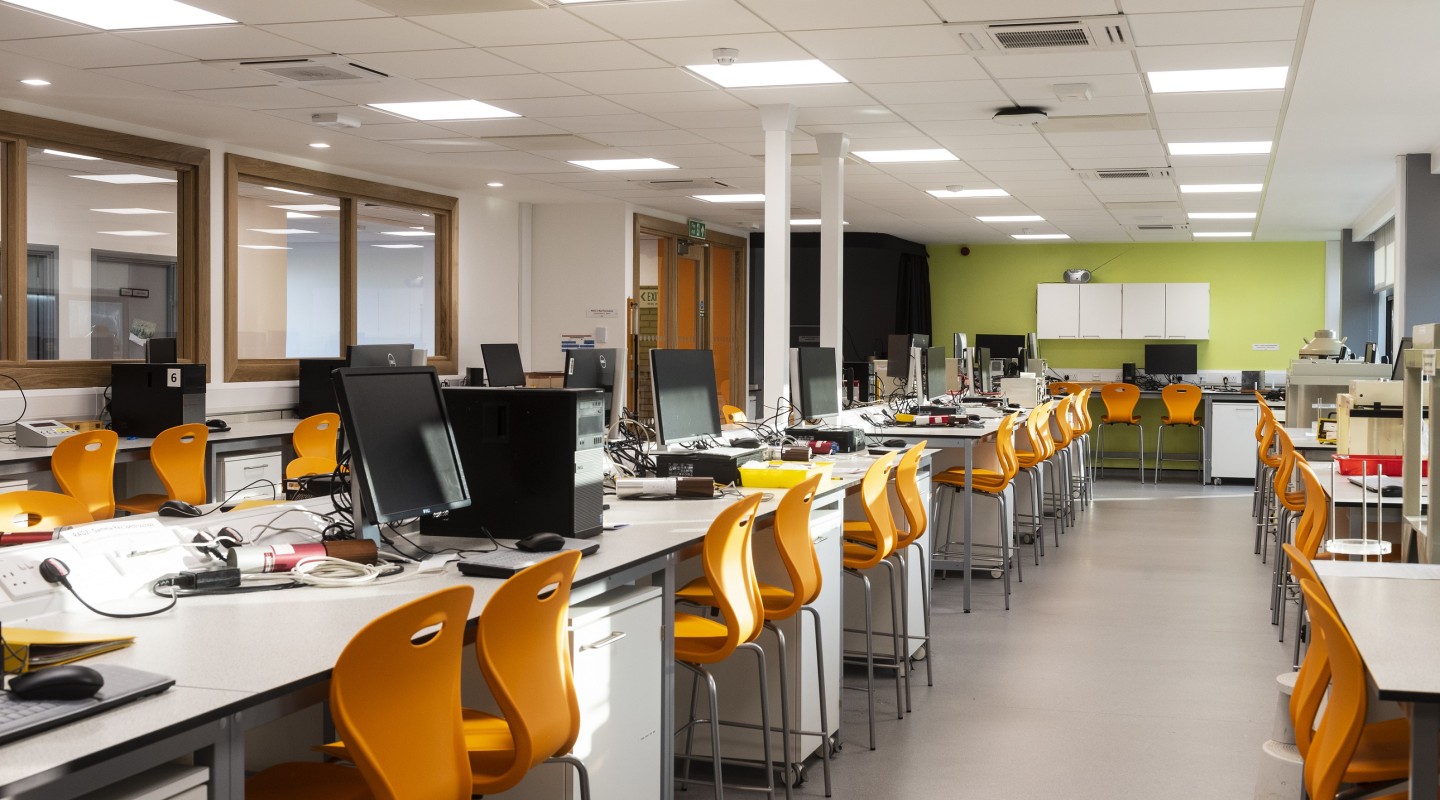
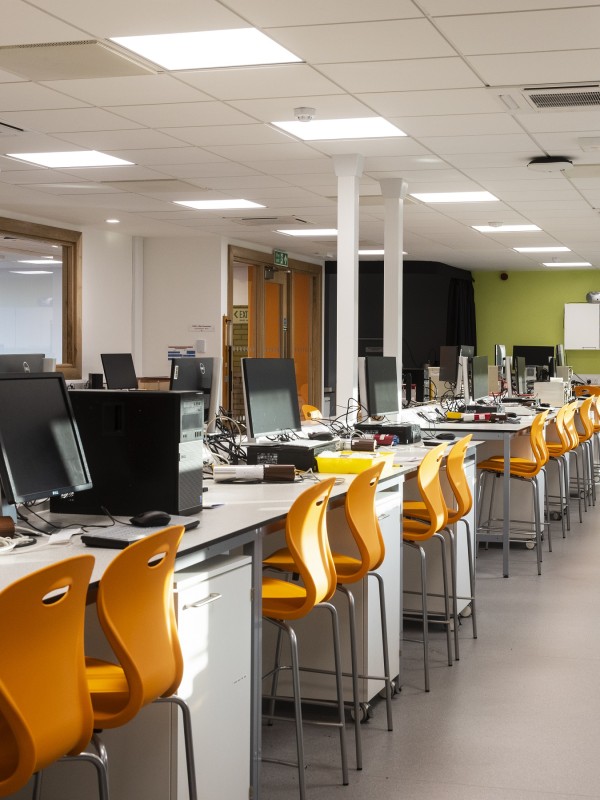
Physics facilities tour
Join us on a virtual tour of some of the leading physics facilities at Surrey, including the undergraduate labs and campus observatory.
Physics facilities tour
Join us on a virtual tour of some of the leading physics facilities at Surrey, including the undergraduate labs and campus observatory.


Tiffany Biles
Student - Physics with Quantum Technologies BSc (Hons)


Ayaan M.
Student - Physics with Astronomy BSc (Hons)
Learn more about the qualifications we typically accept to study this course at Surrey.
Typical offer
- BSc (Hons):
- ABB
- Required subjects: mathematics and physics.
- MPhys:
- AAA-AAB
- Required subjects: mathematics grade A and physics.
- BSc (Hons) with Foundation Year:
- CCC
- Required subjects: mathematics and one of Chemistry, Computer Science, Electronics, Further Maths or Physics.
A-level General Studies and A-level Critical Thinking are not accepted. Applicants taking the Science Practical Endorsement are expected to pass.
GCSE or equivalent: English Language at grade 4 (C).
- BSc (Hons):
- DDD. Additionally, A-level mathematics grade B.
- Required subjects: BTEC Extended Diploma must be in a relevant subject.
- MPhys:
- D*DD. Additionally, A-level mathematics grade A.
- Required subjects: BTEC Extended Diploma must be in a relevant subject.
- BSc (Hons) with Foundation Year:
- MMM. Additionally, A-level mathematics grade C.
- Required subjects: BTEC Extended Diploma must be in a relevant subject.
GCSE or equivalent: English Language at grade 4 (C).
We can also consider a number of other BTEC qualifications or combinations of A-levels and BTEC qualifications. Please contact the Admissions team, specifying your programme of interest, along with details of your own particular combination of qualifications.
- BSc (Hons):
- 33
- Required subjects: Physics HL5/SL6 and either Mathematics Analysis and Approaches HL5/SL6 or Mathematics Applications and Interpretations HL5.
- MPhys:
- 35 - 34
- Required subjects: Physics HL5/SL6 and either Mathematics Analysis and Approaches HL6/SL7 or Mathematics Applications and Interpretations HL6.
- BSc (Hons) with Foundation Year:
- 29
- Required subjects: Mathematics analysis and approaches HL4/SL6 or mathematics applications and interpretations HL4; and additionally one of Chemistry, Computer Science, or Physics HL4/SL6.
GCSE or equivalent: English A HL4/SL4 or English B HL5/SL6.
- BSc (Hons):
- 78%
- Required subjects: Mathematics (5 period) 7.5 and Physics 7.5.
- MPhys:
- 85%-82%
- Required subjects: Mathematics (5 period) 8.5 and Physics 7.5.
- BSc (Hons) with Foundation Year:
- For foundation year equivalencies please contact the Admissions team.
GCSE or equivalent: English Language (1/2) - 6 English Language (3) - 7.
- BSc (Hons):
- QAA recognised Access to Higher Education Diploma with 45 level 3 credits overall including 30 at Distinction and 15 at Merit.
- Required subjects: Access to Higher Education modules must be in relevant subjects.
- MPhys:
- QAA recognised Access to Higher Education Diploma with 45 level 3 credits overall including 45 at Distinction or 39 at Distinction and 6 at Merit.
- Required subjects: Access to Higher Education modules must be in relevant subjects.
- BSc (Hons) with Foundation Year:
- QAA recognised Access to Higher Education Diploma with 45 level 3 credits overall including 21 credits at Distinction, 3 credits at Merit and 21 credits at Pass. Additionally, A-level Mathematics grade C.
- Required subjects: Access to Higher Education modules must be in relevant subjects.
GCSE or equivalent: English Language at grade 4 (C).
- BSc (Hons):
- AABBB
- Required subjects: mathematics and physics.
- MPhys:
- AAAAB-AAABB
- Required subjects: mathematics grade A and physics.
- BSc (Hons) with Foundation Year:
- BBBCC
- Required subjects: mathematics and one of Chemistry, Computer Science, Further Maths or Physics.
GCSE or equivalent: Scottish National 5 for English Language grade C.
- BSc (Hons):
- ABB from a combination of the Advanced Skills Baccalaureate Wales and two A-levels.
- Required subjects: A-levels in mathematics and physics.
- MPhys:
- AAA-AAB from a combination of the Advanced Skills Baccalaureate Wales and two A-levels.
- Required subjects: A-level mathematics at grade A and A-level physics.
- BSc (Hons) with Foundation Year:
- Pass overall with CCC from a combination of Advanced Skills Challenge Certificate and two A-levels.
- Required subjects: mathematics and one of Chemistry, Computer Science, Electronics, Further Maths or Physics.
A-level General Studies and A-level Critical Thinking are not accepted.
GCSE or equivalent: English Language at grade 4 (C).
This route is only applicable to the MPhys course.
Applicants taking the Extended Project Qualification (EPQ) will receive our standard A-level offer, plus an alternate offer of one A-level grade lower, subject to achieving an A grade in the EPQ. The one grade reduction will not apply to any required subjects.
This grade reduction will not combine with other grade reduction policies, such as contextual admissions policy or In2Surrey.
English language requirements
IELTS Academic: 6.0 overall with 5.5 in each element.
View the other English language qualifications that we accept.
If you do not currently meet the level required for your programme, we offer intensive pre-sessional English language courses, designed to take you to the level of English ability and skill required for your studies here.


International Foundation Year
If you are an international student and you don’t meet the entry requirements for this degree, we offer the International Foundation Year at the Surrey International Study Centre. Upon successful completion, you can progress to this degree course.
Selection process
We normally make offers in terms of grades.
If you are a suitable candidate you will be invited to an offer holder event. During your visit to the University you can find out more about the course and meet staff and students.
Recognition of prior learning
View our Code of practice for Recognition of Prior Credit and Prior Learning and further guidance: Credit Transfer and Recognition of Prior Learning - Guide for Applicants (PDF) for more information.
We recognise that many students enter their higher education course with valuable knowledge and skills developed through a range of professional, vocational and community contexts.
If this applies to you, the recognition of prior learning (RPL) process may allow you to join a course without the formal entry requirements or enter your course at a point appropriate to your previous learning and experience. There are restrictions on RPL for some courses and fees may be payable for certain claims.
Contextual offers
Did you know eligible students receive support through their application to Surrey, which could include a grade reduction on offer?
Fees
Explore UKCISA’s website for more information if you are unsure whether you are a UK or overseas student. View the list of fees for all undergraduate courses.
Payment schedule
- Students with Tuition Fee Loan: the Student Loans Company pay fees in line with their schedule.
- Students without a Tuition Fee Loan: pay their fees either in full at the beginning of the programme or in two instalments as follows:
- 50% payable 10 days after the invoice date (expected to be during October to November of each academic year).
- 50% in January of the same academic year.
- The exact date(s) will be on invoices. Students on part-time programmes where fees are paid on a modular basis cannot pay fees by instalment.
- Sponsored students: must provide us with valid sponsorship information that covers the period of study.
Professional training placement fees
Professional Training placement year fees are approximately 20% of the full-time fee for the academic year in which you undertake your placement.
Additional costs
Depending on the placement, students can incur travel, visa and accommodation costs.
These additional costs are accurate as of September 2025 and apply to the 2026 year of entry. Costs for 2027 entry will be published in September 2026.
Scholarships and bursaries
Discover what scholarships and bursaries are available to support your studies.
Our award-winning Professional Training placement scheme gives you the chance to spend a year in industry, either in the UK or abroad.
We have thousands of placement providers to choose from, most of which offer pay. So, become one of our many students who have had their lives and career choices transformed.
Statistics
Placement Statistics
92%
of students who did a placement entered into graduate level employment*
80%
of placements are paid, with 60% paying between £18,000 - £30,000
48%
of our students have been offered a graduate role from their placement provider**
*Graduate Outcomes 2025, HESA
**Professional training year returners survey 2024
Physics with quantum computing placements
The optional Professional Training placement is available to all BSc Physics with Quantum Computing students. Check out our video below to see how Surrey students have thrived on placement, gaining the skills and experience which employers are looking for.
Over the years, we’ve placed our students with many companies and laboratories, including:
- Central Laser Facility at the Rutherford Lab (Vulcan Lasers)
- Centre for Integrated Photonics (Huawei)
- Defence Science and Technology Laboratory
- MBDA UK Ltd
- National Physical Laboratory
- Plasma Quest
- TOPTICA Photonics.
Your personal tutor and the Professional Training tutor will discuss your interests and abilities with you in the second year, and support you in applying to our extensive database of potential employers.
Every October, we hold a Professional Training placement conference, which allows students to hear first-hand experiences from the previous year’s placement students.
Applying for placements
Students are generally not placed by the University. But we offer support and guidance throughout the process, with access to a vacancy site of placement opportunities.
Find out more about the application process.
Research Year placements
Unique to Surrey, our MPhys includes an integrated Research Year which can be completed at Surrey, at a research institution in the UK or internationally.
Past students have undertaken year-long research projects at some of the following:
- Centre for Integrated Photonics (Huawei), UK
- CERN, Switzerland
- FELIX Laboratory, Radboud University, Netherlands
- IAC, Tenerife
- ORNL in Tennessee, US
- Rutherford Appleton Laboratory, UK
- TRIUMF, Canada
- University of Marburg, Germany
- University of Notre Dame, Indiana
- WNSL, Yale University.
All of these research projects involve real cutting-edge research with internationally respected scientists. Most off-campus placements come with a student stipend.
Summer placements
All students have the chance to apply for an 8-10 week paid placement during the summer, typically at the end of their second year. They offer an invaluable taste of real research, as well as adding to your CV.
Placements are available both within the University (ranging from nanotechnology experiments to theoretical quantum physics) and via the South East Physics Network (SEPnet).
Examples of placements students have undertaken are:
- BAE Systems
- Rutherford Appleton Laboratory in Oxfordshire (the UK’s largest scientific facility)
- The Royal Marsden Hospital (one of the world’s leading cancer research hospitals).
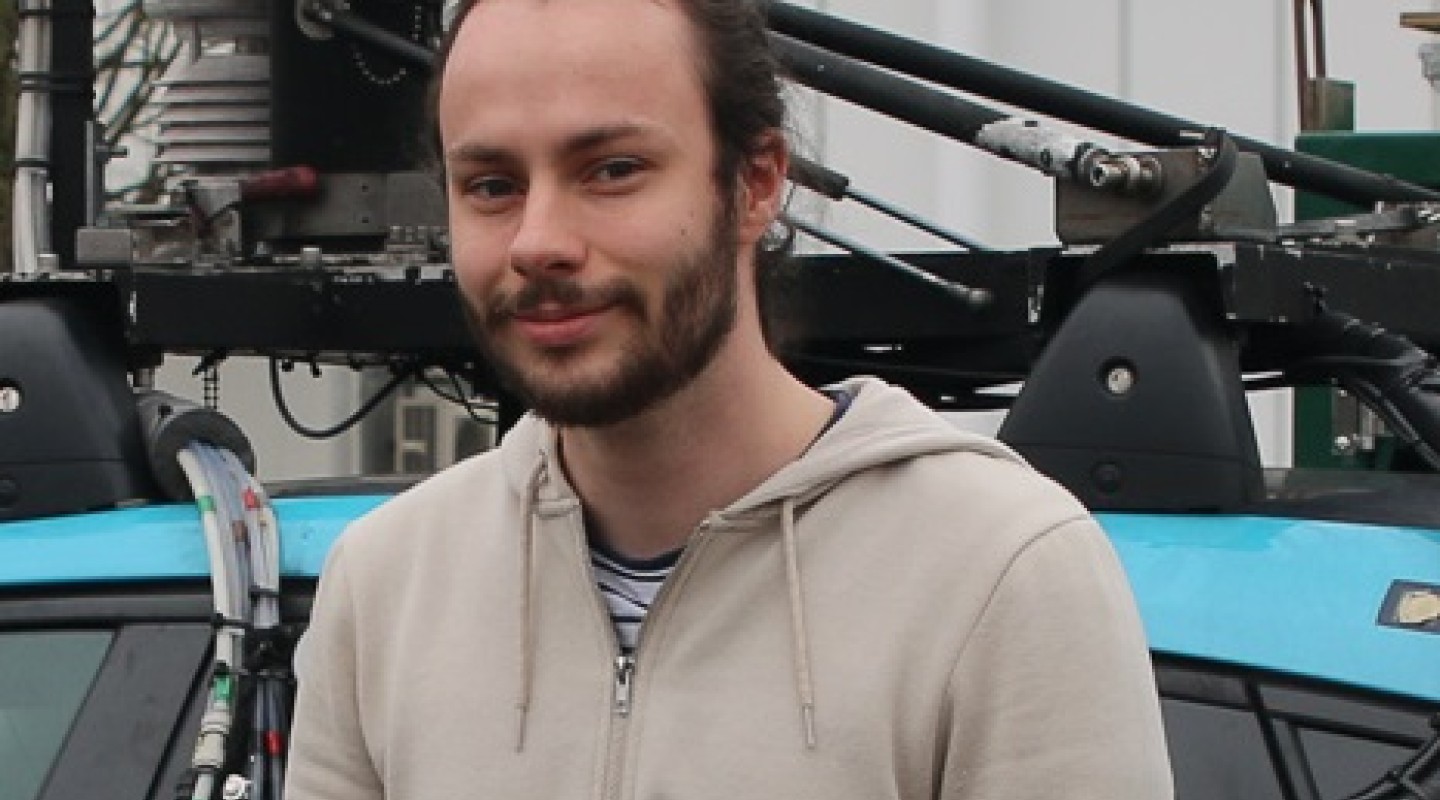
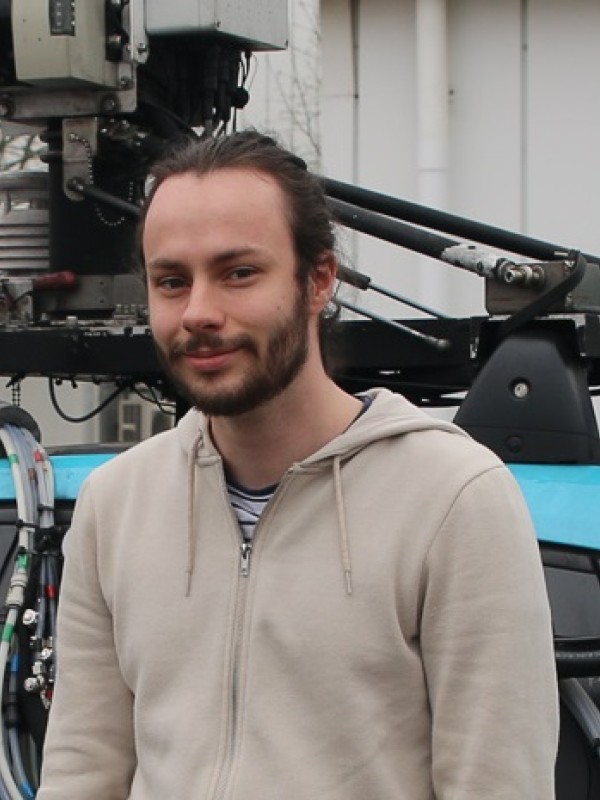
Placement at the National Physical Laboratory
Undergraduate student Stefan Bell, conducted his Professional Training placement at the National Physical Laboratory (NPL), which included working on the Breathe London project using specially equipped Google Street View cars.
Placement at the National Physical Laboratory
Undergraduate student Stefan Bell, conducted his Professional Training placement at the National Physical Laboratory (NPL), which included working on the Breathe London project using specially equipped Google Street View cars.
Study and work abroad
Studying at Surrey opens a world of opportunity. Take advantage of our study and work abroad partnerships, explore the world, and expand your skills for the graduate job market.
The opportunities abroad vary depending on the course, but options include study exchanges, work/research placements, summer programmes, and recent graduate internships. Financial support is available through various grants and bursaries, as well as Student Finance.
Perhaps you would like to volunteer in India or learn about Brazilian business and culture in São Paulo during your summer holidays? With 140+ opportunities in 36+ different countries worldwide, there is something for everyone. Explore your options via our search tool and find out more about our current partner universities and organisations.
Apply for your chosen course online through UCAS, with the following course and institution codes.
About the University of Surrey
Need more information?
Contact our Admissions team or talk to a current University of Surrey student online.
- BSc (Hons)View UCK10F0017U
- BSc (Hons) with placementView UCK10S0017U
- BSc (Hons) with foundation yearView UCK10F0018U
- BSc (Hons) with foundation year and placementView UCK10S0018U
- MPhysView UCK21F0006U
Terms and conditions
When you accept an offer to study at the University of Surrey, you are agreeing to follow our policies and procedures, student regulations, and terms and conditions.
We provide these terms and conditions at offer stage and are shown again at registration. You will be asked to accept these terms and conditions when you accept the offer made to you.
Disclaimer
This online prospectus has been published in advance of the academic year to which it applies.
Whilst we have done everything possible to ensure this information is accurate, some changes may happen between publishing and the start of the course.
It is important to check this website for any updates before you apply for a course with us. Read our full disclaimer.


